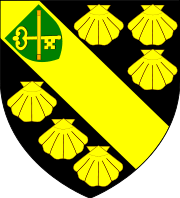Earl of Liverpool
| Earldom of Liverpool | |
|---|---|
|
Arms of Foljambe: Sable a Bend between six Escallops Or, and as an honourable augmentation (granted Aug 1906) on the bend in chief on an Escutcheon Vert a Key surmounted by a Baton in saltire Or | |
| Creation date |
1796 (first creation) 1905 (second creation) |
| Monarch |
George III (first creation) Edward VII (second creation) |
| Peerage | Peerage of the United Kingdom |
| Present holder | Edward Foljamble, 5th Earl of Liverpool |
| Heir apparent | Luke Foljambe, Viscount Hawkesbury |
| Remainder to | Heirs male of the body, lawfully begotten |
| Subsidiary titles |
Viscount Hawkesbury Baron Hawkesbury |
| Armorial motto | Soyes ferme (Be steadfast) |

Earl of Liverpool is a title that has been created twice in British history. The first time was in the Peerage of Great Britain in 1796 for Charles Jenkinson, 1st Baron Hawkesbury, a favourite of King George III (see Jenkinson Baronets for earlier history of the family). He had already been made Baron Hawkesbury, of Hawkesbury in the County of Gloucester, in 1786, and succeeded as seventh Baronet of Walcot and Hawkesbury in 1790. His eldest son, the second Earl, served as Prime Minister of the United Kingdom from 1812 to 1827. The peerages became extinct in 1851 on the death of the latter's half-brother, the third Earl, while the baronetcy was inherited by a cousin (see Jenkinson Baronets).
The earldom was revived in 1905 in favour of the Liberal politician Cecil Foljambe, 1st Baron Hawkesbury, son of George Foljambe and his second wife Lady Selina Charlotte Jenkinson, daughter of the third Earl of the first creation. He was made Viscount Hawkesbury, of Kirkham in the County of York and of Mansfield in the County of Nottingham, at the same time, and had already been created Baron Hawkesbury, of Haselbech in the County of Northampton and of Ollerton, Sherwood Forest, in the County of Nottingham, in 1893. His eldest son, the second Earl, served as Governor-General of New Zealand between 1912 and 1920. As of 2010 the titles are held by the latter's great-nephew, the fifth Earl, who succeeded his great-uncle, the fifth son of the first Earl, in 1969. He is the posthumous son of Captain Peter George William Savile Foljambe (1919-1944), who was killed in action in the Second World War, son of the Hon. Bertram Marmaduke Osbert Savile Foljambe (1891-1955), sixth son of the first Earl. Lord Liverpool is one of the ninety elected hereditary peers that remain in the House of Lords after the passing of the House of Lords Act 1999, and sits on the Conservative benches.
Earls of Liverpool, First Creation (1796)
- Charles Jenkinson, 1st Earl of Liverpool (1729–1808)
- Robert Banks Jenkinson, 2nd Earl of Liverpool (1770–1828)
- Charles Cecil Cope Jenkinson, 3rd Earl of Liverpool (1784–1851)
Earls of Liverpool, Second Creation (1905)
- Cecil George Savile Foljambe, 1st Earl of Liverpool (1846–1907)
- Arthur William de Brito Savile Foljambe, 2nd Earl of Liverpool (1870–1941)
- Gerald William Frederick Savile Foljambe, 3rd Earl of Liverpool (1878–1962)
- Robert Anthony Edward St Andrew Savile Foljambe, 4th Earl of Liverpool (1887–1969)
- Edward Peter Bertram Savile Foljambe, 5th Earl of Liverpool (b. 1944)
The heir apparent is the present holder's son Luke Marmaduke Peter Savile Foljambe, Viscount Hawkesbury (b. 1972) [1][2]
See also
References
| Wikisource has the text of the 1911 Encyclopædia Britannica article Liverpool, Earls of. |
- ↑ "Viscount Hawkesbury and Miss K.F. Davis". Telegraph announcements.
- ↑ "Hawkesbury/Davis marriage". Peerage News.

